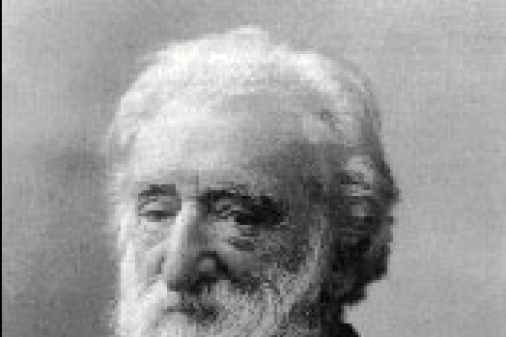
William Booth was born in Nottingham in 1829 into a family where wealth, education and religion were in short supply. In his early teens he started work and at the age of 15 came to faith in Christ in a Methodist chapel.
He wrote in his diary: 'God shall have all there is of William Booth.'
Shortly afterwards he encountered open public evangelistic meetings with lively songs, a powerful message and an 'altar call'. Sensing this was where his calling lay, Booth began open-air evangelism, particularly amongst the poor.
There was no shortage of opportunity. The Industrial Revolution had sent vast numbers of people into the towns seeking work and the result was crowded, unsanitary and impoverished slums, full of social problems. With few exceptions, the established churches, formal and middle-class, were unwilling to be involved.
Booth became a Methodist minister but felt drawn to a purely evangelistic ministry. He met Catherine Mumford and they were married in 1855. It was to be the most supportive and productive of marriages: they had eight children, most of whom became leaders in the Salvation Army.
Booth soon resigned his pastorate and, as itinerant preachers, he and Catherine travelled across England and Wales. In 1865 the Booths settled in east London amidst appalling social problems. Here he started a Christian mission work which sought not only to save souls but also to feed bodies. He wrote: 'You cannot warm the hearts of people with God's love if they have an empty stomach and cold feet.'
In 1878 Booth formalised his mission organisation into what he termed the 'Salvation Army'. The military theme was seen not just in the uniforms and ranks but also in a disciplined structure. 'General Booth', as he was now known, gave the Army its motto 'Blood and Fire', referring to the blood of Christ and the purifying power of the Holy Spirit, and it summed up the new organisation's forceful and determined mood.
The Army rapidly won converts. Their meetings were accessible to those who would never dare to attend a conventional church. Here they received food for their bodies, sang songs to lively tunes and heard converts giving their testimonies and preachers using ordinary language. Above all, there was acceptance: any judgement was to do with sin, not social status. Joining the Army was also appealing because with the uniform came purpose, identity and a sense of belonging.

The Salvationists faced much opposition. Many churches criticised the new movement for the way that they worked with the poor. More aggressive opposition came from those who were offended by the Army's rejection of alcohol and its determined and very visible presence in even the worst areas.
The Salvationists, who put up no resistance, made an easy target for their opponents and there were injuries and deaths. Yet the opposition simply united the Army and gave it publicity. Soon Salvation Army units were being formed across Europe, the United States and Australia.
Increasingly, the Salvation Army became an important force in providing social relief. In 1890 Booth published In Darkest England and the Way Out, a book that not only identified the nation's ills but proposed ambitious projects to help the poor, ex-prisoners and the homeless. Widely read and very influential, many of its pioneering ideas were developed in the twentieth century. One paragraph that struck me when I read his book was:
'I consider that the chief dangers which confront the coming century will be religion without the Holy Ghost, Christianity without Christ, forgiveness without repentance, salvation without regeneration, politics without God, and heaven without hell.'
These words couldn't be more relevant today.
After 35 years of marriage, Catherine Booth died in 1890. William Booth pressed on as the honoured leader of what was now a global ministry. In the last decade of his life he travelled worldwide, meeting kings, emperors and presidents. His death in 1912 was greeted by scenes of extraordinary national mourning. His finest memorial is, of course, The Salvation Army that he founded, which today has 1.7 million members in 119 countries.
Let me suggest four striking elements in William Booth's achievement.
First, I find a remarkable innovation. Many people had been doing work with the poor in various ways, but Booth's genius was somehow to bring together the ingredients of help, evangelism, support and discipleship to produce a formula that, in The Salvation Army, was so spectacularly successful.
Second, I am struck by his astonishing intuition. Booth was a man who made his decisions not so much by analysis as by sheer God-given instinct. Looking back, with all our knowledge of organisational structure and mission, Booth got so much right. Through his pattern of uniforms, music, songs and discipline he built an organisation that those in need wanted to belong to.
Third, I am struck by the way his ministry was integrated. Booth believed that people needed to hear the good news of Jesus Christ but that preaching to them when they were hungry was pointless. These days we would call this 'holistic mission' and praise it; Booth pioneered it.
Finally, I'm struck by how Booth's ministry was marked by independence. He never waited for consensus or collaboration and cared little for what other people or other denominations thought. When he couldn't find a supportive denomination, he created his own. This stubborn independence – so often a necessity with pioneers – allowed him to achieve so much so fast.
William Booth wrote:
"While women weep, as they do now, I'll fight; while little children go hungry, as they do now, I'll fight; while men go to prison, in and out, in and out, as they do now, I'll fight; while there is a drunkard left, while there is a poor lost girl upon the streets, while there remains one dark soul without the light of God, I'll fight, I'll fight to the very end!"
At his conversion Booth promised God everything that there was of him. I think he kept that promise and I think, too, that God richly honoured it. May we, too, promise God everything that there is of us.













